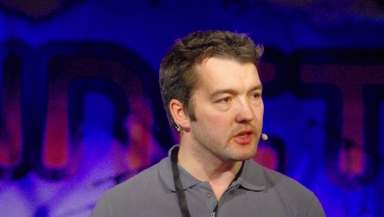
It's the big question, and sooner or later almost everyone has to deal with it.
How can God really be good when we experience suffering? We might manage to get through it when times are hard and we're in pain or distress – or worse, when we see someone we love in pain or distress – but often we're left with unanswered questions. Furthermore, if suffering is protracted and intense, we might wonder if we can maintain our faith in a good and loving God, or if there'll come a point when we'll just break.
In a Spring Harvest talk yesterday, Tom Price, who lectures for the Oxford Centre for Christian Apologetics, told his audience that meeting the right kind of question with the right kind of answer was vital – or, as he put it, "Don't try to fix your computer with water." It's good for mopping floors and cleaning clothes, but not for mending electronics. So there are intellectual questions and there are relational questions, and it's important not to get the two mixed up.
Some writing and speaking about suffering and the problem of evil is inherently unsatisfactory because it doesn't seem to recognise the scale or the depth of the problem. Price addressed that issue head on. Christians, he said, shouldn't "settle for any kind of answer that reduces pain and evil to less than what they actually are. If we just reduce evil to the illusory, if we don't say there are real right and wrong things, that's reductive. It's unreasonable to ask us to water down evil."
At an intellectual level, the problem for Christian theology is very specific, because of what we believe about God. He is wholly good, he can do anything he wants, yet evil exists: it's the classic statement of the apparent contradiction at the heart of Christian theology. As CS Lewis put it: "If God were good, he would make his creatures perfectly happy, and he were almighty he would be able to do what he wished. But the creatures are not happy. Therefore God lacks either goodness, or power, or both."
So, what's the answer? Price offered several complementary approaches. He argued that "Good people may need to live in a world where choosing wrongly is possible." God can't do things that are logically impossible. Perhaps producing people with character and personality without giving them the capacity to choose wrongly is also impossible – and choosing wrongly implies consequences. For instance, if we were only ever able to act in a way that helped people rather than harmed them, our relationship with God would be illusory: we'd never know that we needed him.
However, not all the suffering in the world is because of human choices. Some of it is because of the structure of the physical world: earthquakes, for instance. Couldn't God do something about that?
Well, perhaps. But Price cited the work of fellow OCCA team member Vince Vitale, who has recently published Why Suffering? Vitale says that we can imagine a different world with a bit less pain and suffering. Why didn't God do that? "Our assumption is that we would be the same person we are now. But some of what we are now is dependent on the pain and suffering we have been through."
In a striking analogy, he says: "When parents bring a child into the world, they are consigning that child to a slow and painful death. If you choose to procreate, you know your child will have to cope with suffering and ultimately death. But that not what we desire for the child." In the Christian faith, he says, what we see is a God who is committed to the wellbeing of his children in the same way.
From a purely intellectual approach to the question, Price moved to a practical engagement with it. "How can I cope with pain today?" he asked. "How can God meet me in my tears?"
He referred to the story in John 9 of the man who was born blind, and Jesus' assertion that his condition was "so that the work of God might be displayed in his life". We shouldn't be concerned with finding someone to blame. However, he said: "There is no injustice or evil that won't be held to account. It can be an extraordinary sense of comfort to know that people will have to answer for how they've behaved or what they've done" – and for Christians, Jesus is held responsible through his death on the cross.
For Price, it's the cross that is the key to understanding suffering: Jesus' total isolation from his Father means that he can understand the isolation and aloneness that we feel in our own suffering. And so, "We can see in the cross a solution where the wrongness of this world is exchanged for goodness of God."




















